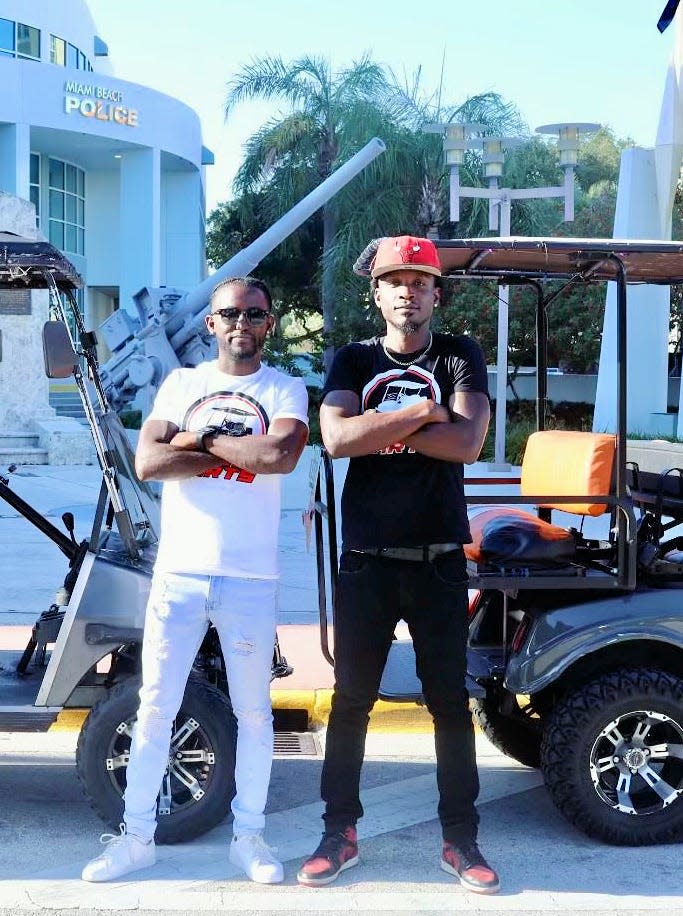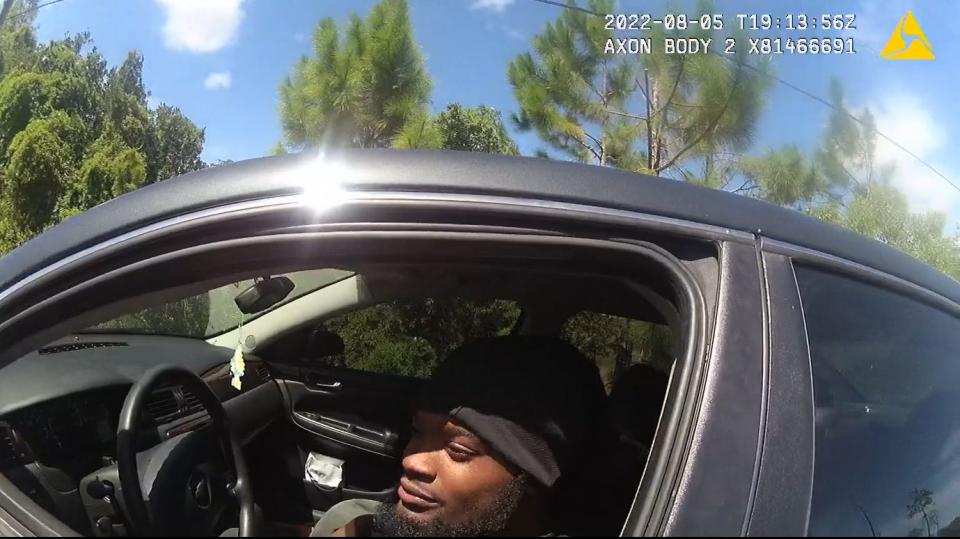Tickets for loud music nearly 3 times more likely for Black drivers under new Florida law
GAINESVILLE – Black drivers in Florida are nearly three times more likely to be ticketed by police and sheriff’s deputies under a law that allowed law enforcement to cite drivers for loud music starting last year, according to a new analysis of traffic data and court records.
The analysis showed that Black drivers received almost 37% of the tickets, despite Black people making up only about 16% of Florida's driving-eligible population.
Law enforcement cited Black drivers at a rate of just over 11 tickets per 100,000 Black drivers, and cited white drivers at a rate of 3.9 tickets per 100,000 white drivers.
Radio blaring? Turning up car radio may get you pulled over, as new traffic rules are in effect
Bill Cotterell: Florida just made it illegal to crank up the volume while driving. But will it stick?
The investigation is the first broad review of enforcement of the law since it took effect nearly one year ago. It examined nearly 850 loud music tickets from May through December, obtained under Florida’s public records laws from the state’s Traffic Citation Accounting Transmission System.
The analysis was part of an investigative reporting project in the University of Florida College of Journalism and Communications. The law was passed by Florida’s GOP-controlled Legislature last year and signed by Gov. Ron DeSantis.
'Stop being racists,' says man ticketed 5 times for loud music

Carven Exantus, 34, of Miami has been ticketed five times for loud music – at $129 each – by police in Miami Beach, including twice the same day 90 minutes apart in October. Exantus, who is Black, beat four of the tickets in court, so far. His most recent ticket was the afternoon of March 9 along Ocean Drive. He has pleaded not guilty.
He urged police and the Legislature to suspend enforcing the law: “Stop being racists, simple. Something is disproportionately affecting one group, and it's designed to be that way. If it's walking and quacking like a duck, it's a duck. It's racist.”
Exantus was ticketed driving road-legal golf carts with license plates and headlights for his business, Crew Cart Services LLC of Miami. It offers tours, pick-ups and drop-offs for tourists and locals along the beach district. The carts, with stereos, are open-air with no doors and no windows.
“We're getting harrassed to the point where I can't even conduct business,” Exantus said
His business partner, Fred Laurice Johnson, 33, has been ticketed four times in Miami Beach for loud music and contested all the $129 tickets. On Friday, he beat a ticket in court that accused him of playing Maroon 5 too loudly on Dec. 1. The judge dismissed it when the officer didn't show up to testify. Johnson, who is Black, and Exantus said they have never seen police use a sound-measuring device before writing tickets for loud music.
'It's up to the cop's discretion.' Motorists ticketed say they feel targeted
"It's up to the cop's discretion," Exantus said. "I've asked, 'Can you show me and prove to me that we're being too loud?' Then they get really mad, and they'll definitely give me two tickets after that."
Rondrae Thomas Wright, 49, of Coral Springs, was cited in Fort Lauderdale on July 1 driving a Slingshot three-wheeled motorcycle along the oceanfront boulevard near Sebastian Street Beach. The police officer said he could hear Wright's music even as Wright drove away from him. A judge dismissed the ticket after Wright, who is Black, fought it in traffic court two months later.
Wright said he felt targeted. “That was exactly what that was about,” he said in an interview. “I was like, damn, my radio is not even loud. I couldn’t believe he did that.” His wife, seated next to him in the cockpit that day, was in disbelief, researching the new music law using Google as the police officer wrote the ticket, he said.
"I was saying that from the beginning, that this law would target Blacks," said Sim Oliver Crum Jr., 46, of Starke in north-central Florida. Crum, who is Black, was ticketed three times under the new law, twice in October by the Jacksonville Sheriff's Office and in December by Gainesville police.
"I don't like nothing about that law, period,” Crum said. “You should be able to play your music if you want. What do they have to do to prove they can hear you play your music from 25 feet away?"
Police say law helping to reduce noise as they pull over egregious cases
Police said the new law is helping to reduce noise where cars are driving with loud music. Officer Mike Vega, a spokesman for the Miami Police Department, said officers are pulling over egregious cases. The agency there issued 65 tickets over six months, including to 18 Black drivers, 27 to white drivers and 20 to drivers identified in license records as “other.”
“We now have the authority to go and say, ‘Hey, you need to lower your music,’” Vega said.
The analysis showed that white non-Hispanic drivers received about 46% of the tickets, with white non-Hispanic people making up 56% of the state's driving-eligible population. Police officers and deputies issued the rest of the tickets for loud music to drivers identified as Hispanic, “other,” such as multiracial, or Native American.
Florida's Republican-controlled House passed the bill allowing loud music tickets last year 83-32, largely along party lines. All but one of the 19 House Democrats who were Black voted against it. One Black Republican supported it. Eighty-one white lawmakers voted for it, including 76 Republicans.
The last stop in the Senate, the Rules Committee, approved its version of the bill 11-6, with three of the four Black lawmakers on the panel voting against it. The Senate deferred to the House version, which DeSantis signed on May 26. The new law took effect immediately.
The House bill’s sponsor, Rep. Tom Leek, R-Daytona Beach, said last year it was intended to crack down on so-called popup parties or meets – he called them “invasions” – that have been the subject of complaints by homeowners in neighborhoods where drivers gather and generate too much noise.
Leek did not respond to phone messages and emails since last week asking to discuss how the law he championed was being enforced.
Police in Daytona Beach Shores along the Atlantic coast – in Leek’s district – issued 17 loud music tickets over a single June weekend during an unsanctioned truck meet there. The department said on its Facebook page it was its first use of the new law. All those drivers were white.
Miami Beach leads Florida in where most loud music tickets issued

Across Florida, Miami Beach issued the most loud music tickets, at 155 – with 75 for Black drivers. The sheriff’s office in Jacksonville issued 67, with 49 for Black drivers. In Gainesville, where police ticketed Crum and the police chief is Black, officers wrote 26, with 21 for Black drivers. A police spokesman there, Sgt. Joseph Castor, said he was not immediately available for an interview.
Around Orlando, the Orange County Sheriff's Office and Orlando Police Department together wrote 37 tickets, including 21 for Black drivers, 12 for Hispanic ones and only four for white ones.
Tracking how Florida’s loud music law is enforced in the future will be hampered by another new law the Legislature passed last year. Signed by DeSantis in June and sponsored by Sen. Gayle Harrell, R-Stuart, and Rep. Chuck Brannan III, R-Lake City, the proposals blocked the release of some driver information on traffic tickets or crash reports after March 1. Citing the need to protect drivers’ privacy, lawmakers in the House voted for the new law 115-1, and the Senate voted 35-3 to keep such details off limits to the public.
Sen. Lori Berman, D-Boynton Beach, warned that the new law would prevent scrutiny of how police ticket drivers. "Without the redacted traffic citation information, it's harder to track tickets and we can't see if they're being disproportionately issued in certain areas," she said last year during debate on the bill.
The new analysis showing Black drivers being ticketed far more often used drivers' dates of birth and license numbers – which are now confidential – to help track them down across Florida for interviews, find court records in their cases and confirm details about their race or ethnicity when authorities failed to specify it.
This story was produced as an investigative reporting project in the University of Florida College of Journalism and Communications. The reporter can be reached at mmcglone@ufl.edu.
This article originally appeared on The Gainesville Sun: Florida loud music law targets Black drivers more than white motorists

